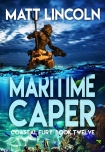The Saboteurs, Clive Cussler [dark academia books to read .txt] 📗

- Author: Clive Cussler
Book online «The Saboteurs, Clive Cussler [dark academia books to read .txt] 📗». Author Clive Cussler
He lit a cheroot and said lazily, “There may be something that can be done to delay the completion of the canal and give you the time you need to attract enough capital to build up a manufacturing base.”
Guzman’s eyes glittered, and he swept back to the table. “What are you saying? Please don’t tease me, old friend.”
“At this point, let me just say certain technological breakthroughs have been made that would allow an interested party to severely delay the American construction effort, a matter of years rather than months.”
“You can really do it?”
“Not me, but a team of men, trained and determined men. They can prevent the canal from opening long enough for you to strengthen Argentina’s economy and ensure a future for your people that’s far brighter than it would be otherwise.”
“How quickly could this happen?” Guzman asked, knowing the sooner it took place, the better it would be. The canal’s construction had been a concern for several potential investors he was currently courting.
“It would take some months to lay the groundwork for the operation,” Dreissen admitted. “Security isn’t particularly tight, but access is difficult. The Canal Authority is like a nation unto itself.”
Guzman took a moment to recharge his glass and calm his nerves. Learning that all may not be lost had let his imagination and ambitions run wild. He gathered his wits, knowing that Dreissen had baited a trap with a bishop or rook while his queen lurked someplace on the board ready to pounce.
He said, “I understand why you want to keep it unofficial for now. I also see why you would bring this to me and, say, not the Brazilians. They are in no position to offer you much by way of compensation. I must ask what it is you want from me in return?”
“The rolling stock for the Lacroze line. I want Essenwerks to build the cars and engines and have exclusive contracts for any additional lines constructed below the streets of Buenos Aires.”
“Done,” Guzman agreed quickly and started to get to his feet, amazed that it was at such a low cost.
“The rest,” Dreissen said, freezing Guzman, half standing, and the smile on his lips, “will be determined by members of our respective nations’ diplomatic corps.”
“This is something your government is behind?”
“It is something we made them aware of. Companies like Essenwerks and Krupp are so large that we need to keep the Kaiser and his Ministers aware of some of our activities. It is so they can manage the economy with the utmost efficiency. It is a partnership of industry and state. I believe the term is synergy. What is best for Essenwerks must also be best for the Fatherland, and vice versa.”
“I see.” Guzman’s earlier delight had cooled. The subway contract covered Dreissen’s expenses for the operation. The German government would want far more for giving his nation a future beyond that of an agrarian backwater. “Do you have any idea what the Kaiser wants for helping us?”
“It’s not as bad as you think, Matias. I am about to tell you something under the strictest of confidence because it will help you at the bargaining table. When I first proposed this to the government, the Kaiser himself liked the idea of slowing the Americans’ progress. He doesn’t like their rapid ascent on the world stage since they defeated Spain and took Cuba and the Philippines. He would like to see them slowed in their rise. He tried and failed once before to interfere in their internal affairs and likes the opportunity to try again. My government will want much from you, no doubt, but they also want this to happen so the negotiations will succeed.”
Guzman recognized the gift he’d just been given. “Thank you for sharing that.”
“I will also share that they think so highly of this plan, they’re embedding an agent in Panama to monitor our progress.”
“You don’t seemed so pleased by that.”
“It is the price of working with the government, I suppose. They don’t understand the motives of a capitalist. I am in the business of selling machines—trains, automobiles, aircraft. The more customers I can keep, the more my factories prosper. Synergy.” He drew on his slender cigar and blew a cloud of fragrant smoke toward the ceiling. “If I may offer some advice . . . With the time this operation buys you, I recommend partnering with the Venezuelans and locking in contracts for their oil. If you have the fuels needed for an industrial economy by the time the canal finally opens, its presence won’t matter. Argentina will be a destination port for trade with every civilized nation on earth.”
2
San Diego, California
April 1914
As the Coronado Ferry neared the halfway point across San Diego Bay, Isaac Bell turned to look back at the burgeoning city. The skyline was still modest, just a few buildings with multiple stories, but he knew the fate of the city—in fact, the entire West Coast—was about to undergo tremendous upheaval. Los Angeles, this town, and even his beloved San Francisco, still recovering from the earthquake and subsequent fire just eight years prior, were all going to experience unprecedented growth in the coming years.
It wasn’t so hard to believe, he mused, that the fundamental nature of the entire country was going to change as a result of what was happening in Central America.
He glanced over his other shoulder at the two warships lying at anchor close to a dry dock facility. Already, the Navy was considering a new base along the California coast, and these two battlewagons, plus others, were exploring all the major harbors. The big, armored cruiser, USS Maryland, was over five hundred feet in length and had the distinct pale hull and khaki upperworks of Teddy Roosevelt’s Great White Fleet. Her four funnels were as





Comments (0)